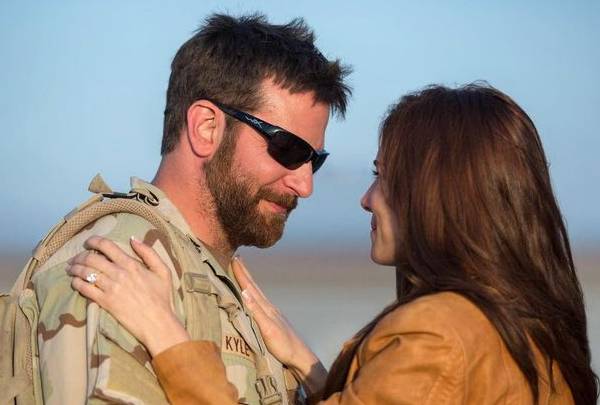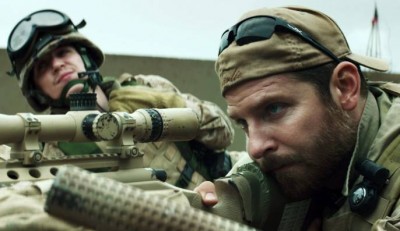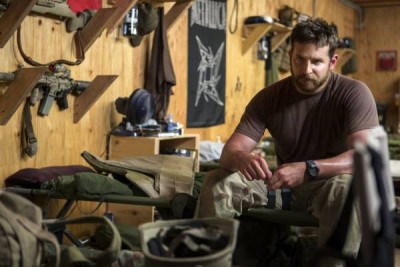
“American Sniper” – a film review by Gary Chew
Clint Eastwood has found something to gain our curiosity more effectively than talking to an empty chair that, in turn, may surpass the finesse that brought another film to the recent attention of the entire world. That movie was The Interview. Mr. Eastwood’s is American Sniper — now opening.
 It’s as if we haven’t been busy following news reports of domestic terrorists on the loose in Paris and rural France, or on-duty New York City police officers being assassinated in their cruiser, or other cops in Missouri and Ohio shooting dead unarmed black males. But even with all that carnage, it seems Mr. Eastwood still has a hit on his hands. How could American Sniper miss as a hot box office item? After all, in case you haven’t noticed, our nation does have a pervasive penchant for firearms – be they handgun or long rifle. Just ask Wayne LaPierre.
It’s as if we haven’t been busy following news reports of domestic terrorists on the loose in Paris and rural France, or on-duty New York City police officers being assassinated in their cruiser, or other cops in Missouri and Ohio shooting dead unarmed black males. But even with all that carnage, it seems Mr. Eastwood still has a hit on his hands. How could American Sniper miss as a hot box office item? After all, in case you haven’t noticed, our nation does have a pervasive penchant for firearms – be they handgun or long rifle. Just ask Wayne LaPierre.
This almost sexual obsession with weapons that fire bullets couples with a inconsistent story about a real man who, according to the movie, once said, “I’m not a redneck, I’m from Texas.” (I guess that’s supposed to mean we’re obliged to give him a pass for being a native of the Lone Star State.)
American Sniper could be placed in the same genre with In The Valley of Elah (2007) since both films are about men in the US military who fight in Iraq then come home after being caught up in ruthless, enervating conflict. However, each movie plucks political strings that play very different tunes.
 The song Mr. Eastwood would have you sing is that of the late US Navy Seal sniper, Chris Kyle. Kyle was shot to death two years ago on a Texas gun range by a mentally disturbed military veteran. The vaunted marksman was attempting to give Eddie Ray Routh therapy for PTSD.
The song Mr. Eastwood would have you sing is that of the late US Navy Seal sniper, Chris Kyle. Kyle was shot to death two years ago on a Texas gun range by a mentally disturbed military veteran. The vaunted marksman was attempting to give Eddie Ray Routh therapy for PTSD.
In fairness, I have to commend the actor Bradley Cooper, who plays Kyle in the movie, in a most strenuous way for his performance. I spent much of my life in that part of America where the culture of swaggered masculinity thrives and is encouraged. Cooper is flawless in his interpretation. His body language is perfect. His accent is perfect. I think it’s his best work.
Two flagrant changes in character motivation in Sniper are worrisome. Kyle’s wife Taya — played by Sienna Miller — has an unexplained change of heart about whether she can remain with Kyle due to the distance she feels his apparent PTSD has taken him from her. Suddenly, on a later return from one his several Iraq tours — boom — she’s OK with the relationship. Another quick switch comes from Cooper’s performance: Kyle, without much therapy it seems, regains himself from PTSD. It appears the film wants to make short order of the mental healing that takes place in Kyle’s mind.
Instead, Mr. Eastwood, in the third act, gives us an extended battle scene that I curiously found causing the film to lose its punch. Less battle there and more reasons for motivational changes in the two principal characters would have muted the movie’s pandering quality for excitation through violence and pain. This, for me, caused American Sniper to well miss its likely mark of making my day.
Whether Chris Kyle was or was not a true hero and legend in his own time is something to debate. What’s most important to remember if you see American Sniper is that the movie does not justify the American invasion of Iraq during the George W. Bush Administration.
We should mourn Chris Kyle’s untimely death. The irony of it is a most bitter legacy that should not be forgotten.
- Movie Review: ‘The Glorias’ - September 28, 2020
- Movie Review: ‘I’m Thinking of Ending Things’ - September 10, 2020
- Movie Review: ‘The Burnt Orange Heresy’ - August 31, 2020

